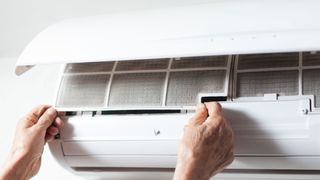We’re all spending a bit more time at home at the moment due to COVID-19 and your attention might have turned to the air quality in your home. If you’re looking to give your current air conditioner a good clean to keep it running better and for longer, just take a look below. If you’re looking to buy or upgrade, then take a look at our selection of the best central air conditioning units (opens in new tab). With recent concerns asking can air conditioners spread coronavirus (opens in new tab), we’ve put together our top tips for cleaning your air conditioner including the coils, filters, and answering some common air conditioning questions. If extra time working from home means you’re spending more and more time in a stuffy home office, then maybe one of the best portable air conditioners (opens in new tab) could help you dip a toe into the world of fresher air, without having to go through the installation process of the more permanent models. Or if you’re looking for another single-room option but are a little short on floor space, one of the best window air conditioners (opens in new tab) could be a great option. Whichever type of air conditioner you currently have or you’re looking to buy, it’s especially important for those with asthma, allergies, or hayfever to keep your air conditioner clean. According to Mayo Clinic (opens in new tab), using an air conditioner can help lower the amount of pollen, mold, mildew, and other airborne outdoor allergens in your home. However, a grimy, dusty air conditioner won’t be able to do the best job.
How to clean air conditioner coils
Cleaning your air conditioner coils helps maintain efficiency and extend the lifespan of your system so it’s important to make sure they’re clean and dust free. The best time to clean your air conditioner coils is in the spring, just before it takes on the load of cooling your home in hotter weather. First and most importantly, shut off the power to the air conditioner. Most outdoor units have an appliance shut off box where you can just flip a switch or remove the fuse. If you don’t have a shut off box, or are being extra safety-conscious, you should turn off the power at your home’s circuit breaker. Remove any outer casings on your air conditioner unit and make sure you can easily access the coils without disturbing any wires. From here, you can use compressed air to remove loose dirt and debris, try to spray from the inside of the unit outwards. Next, you can use an all purpose cleaner to clean the coils, avoiding spraying any electrical components. Make sure the cleaner has been rinsed off, before leaving the unit to dry completely. After this, you simply need to reassemble and reconnect your unit for efficient air conditioning all summer long.
How to clean air conditioner filters
There are a few stages you should complete to give your air conditioner filter a good clean, which we’re going to run through below. Try to clean it once before summer and again on a monthly basis to keep your air conditioner running efficiently. First, turn off the electricity supply and remove the air conditioner cover. Remove the filter and check that it’s washable and not a disposable filter. If you’re not sure, check your air conditioner manual. Use the brush attachment on your vacuum cleaner to gently remove visible dirt and grime. Filters can be delicate so avoid pressing too hard on the filter or you might end up with a dented and ineffective filter. Next, give your filter a gentle wash in a bath of lukewarm water with a small amount of detergent added. Give it a bit of a swish around, but don’t scrub or you’ll find yourself buying a brand new filter. Filters are rarely sturdy enough for a run through the dishwasher, so it’s a shortcut we don’t recommend risking. Make sure the filter is completely dry before reinstalling in your air conditioner.
How to clean your HVAC system
Learn how to clean your HVAC system to prevent build-up of dust and grime for cleaner air in your home. Start by replacing or cleaning your filters. Some filters are disposable and just need a quick switch-out, while others have filters that can be cleaned, see below for a step by step guide. Next, make sure the area around your outside HVAC unit is clean and clear by removing any errant shrubbery, dirt and branches. If it’s within two feet of your unit, it’s got to go. Any dust and grime on the unit itself can simply be washed away, but only after the power supply to the unit has been shut off. Then shift your focus to the vents and floor registers. As the air delivery systems, you don’t want a build up of grime causing any pesky blockages. Give them a wipe down or use a vacuum hose to shift any dirt. Give your system a little test and finally, reset your thermostat. Every four or five years, your ducts will need a professional clean to remove any dirt build up and to give your whole system a thorough check-up.
Is it OK to spray water on your air conditioner?
Some elements actually benefit from a spritzing, but be careful where you spray it. The AC condenser likes a little spray of water on the regular to extend its lifespan and keep it working efficiently, but be careful to avoid electrical components at all times.
How often do you need to clean your air conditioner?
Ideally, it’s best to make sure your air conditioner has a thorough clean twice a year, but make sure it at least gets a good clean in the spring before it goes into full use. You don’t want to be circulating dirty air around your home or risking a blocked system, so keep those coils and filters sparkling.
